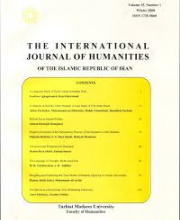
The International Journal of Humanities
The International Journal of Humanities, Volume 21, Issue 1 (2014) (مقاله علمی وزارت علوم)
مقالات
Humanities is the oldest area of study that revolves around the study of human beings, what makes us human and our historical development, and what we are expected to do. This discipline deals with human behavior, human nature, social and political values. Humanities comprise of various disciplines that include art, history, law, linguistics, philosophy, religious and ethics among others. All these subjects affect us as human beings and has an effect on our historical development as well as where we are headed to. Proper teaching of the humanities goes beyond learning the best way to write a sentence or how to draw a comparison between historical figures. In other words, if sciences represent the development of the mind, the humanities, as the name implies, exemplify the development of the human soul. In the current paper, the author discusses the crucial contribution of the humanities by exploring its actual meaning as well as its distinctive features.
Shari‘ati and the (Elusive) Quest for a Just Order(مقاله علمی وزارت علوم)
Ali Shariati was undoubtedly among the most important of the prerevolutionary Islamist thinker particularly insofar as he made Islam a politically respectable force for many young men and women in Iran's traditional middle classes. Shariati was novel for the time in terms of his education and intellectual influences. The clear attraction of ideology for Shariati is that he believes by means of it man is endowed with the capacity to transform the world around him. The current paper tries to explore the manner in which Shariati carried out his highly politicized reading of Islam, assigning centrality to the notion of a just order. Author argues that Shariati's quest for a just order is more important than the order itself.
Epic and National Self-Consciousness: The Case of Shahnameh(مقاله علمی وزارت علوم)
This paper aims to explore the relationship between epic poetry and national self-consciousness and in particular study how Shahnameh may be analyzed from this angle. What is the relationship between the Shahnameh and the Iranian national self-consciousness? What can one say about the Iranian national self-consciousness on the basis of this text? What does the text reveal about the Iranian identity? A related question should also be answered, is the Shahnameh an epic? This is not a pedantic question concerned merely with definitions and labels. As will become clear, an epic reveals a great deal about the national consciousness of the people to whom it belongs (or who belong to it); to identify a poem as an epic, is to be making an important statement about the national consciousness of a people. The question of whether the Shahnameh is an epic or not is hence far from a pedantic one. It takes us right into the heart of Iranian national consciousness
Narratives of "Interculturality": Meeting Again Differently(مقاله علمی وزارت علوم)
Modern Europe witnessed a historical simultaneity as the result of which , not only Europe ruptured from its own past, rather a forced attachment to the non- European's future was also forged. This historical "development" has been narrated in the "colonial discourse". On the other hand, for the non–Europeans, however, a different historical simultaneity took place. Hence; the colonized/non -Europeans found themselves forcefully ruptured not only from their own selfhood, but also thrown in an imposed 'state of nature' dispossessed of their identity. This historical experience has been narrated in the "post-colonial discourse". The current paper is an attempt to host a 'meeting' between the colonial and the post-colonial discourses.
Heuristic Appropriation of Aristotle’s Topos / Logos for Understanding Inscriptions of Persian Kings(مقاله علمی وزارت علوم)
With regard to the essential role and function of topos / place (in comparison with time) in the thinking, acting and speaking of the ancient individuals, it is possible to analyze the inscribed speeches of ancient Persian kings according to their conceptions of topos or place. For reaching to this aim Darius' inscriptions in Behistun (DB) will be chosen and they will be analyzed within an appropriate heuristically Aristotle framework.
Three Different Readings of al-Farabi’s Political Philosophy(مقاله علمی وزارت علوم)
Addition to historical analyses, three different types of reading of the ideas of al-Farabi have been offered: First, the connection between his ideas and the Greek thought; second, the connection between his ideas and theology, and the relationship that can be established between philosophy and religiousness; and third, the explication of al-Farabi’s ideas on the basis of the crisis (-es) he faced. In the present article the relationship between al-Farabi’s philosophy and Greece, Islam and the social crisis of the time are elaborated on.
Political Implications of Abbas Kiarostami’s Cinema(مقاله علمی وزارت علوم)
Political Cinema is defined as a "political event", a "biography", or "process". Such a definition is, however, not inclusive enough to cover the films which focus on the normative aspects of politics without necessarily narrating a special political issue. By reviewing Abbas Kiarostami’s films, this article attempts to revise the definition of political cinema and propose the notion of normative political cinema .